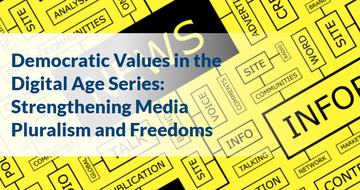
The European Democracy Action Plan (EDAP) provides guidance for strengthening media freedom and media pluralism in key areas. However, there are challenges created by the management of social life through industry media monopolies.
In Part 1 of this 5 part series, UCD Centre for Digital Policy leads participants in considering what new obligations should exist as a result of the European Democracy Action Plan and what state regulatory frameworks and industry must do to achieve its aims.
The conference will take place on Wednesday, 28 September 2022 from 1:00 to 5:00pm at the Museum of Literature Ireland.
Agenda:
1:00 – 1:10pm Welcome from UCD Centre for Digital Policy
Professor Eugenia Siapera and Assistant Professor Elizabeth Farries, Co-Directors
1.10 – 2.00pm Fireside chat with Hon Barry Andrews MEP and Brendan Howlin TD
Facilitated by Celene Craig, Chief Executive, Broadcasting Authority Ireland
2.00 – 2.20pm Coffee
2.20 – 3.20pm Session I. Operationalising goals for media freedoms and pluralism
Facilitated by Stephanie Costello (PhD Candidate, School of Media TU Dublin)
Panel. Chiara Sighele (OBC Transeuropa), Lois Kapilla (Dublin Inquirer), Colin Scott, Professor of EU Regulation and Governance, UCD Sutherland School of Law (currently serving as Vice President, Equality, Diversity and Inclusion, UCD and Principal, UCD College of Social Sciences and Law)
3.20pm – 3.40pm Coffee
3.40 – 4.40pm Session II. Platforming social life: The implications of commercialised media for freedoms and power
Facilitated by Professor Eugenia Siapera
Panel. Associate Professor Tanya Lokot (Digital Media, DCU), Mark Little (Kinzen), Dr Harry Browne (Senior Lecturer, School of Media TU Dublin)
4.40pm – 5pm Closing remarks
To register online attendance, visit here .
Tags: Ireland Media freedom Media pluralism Digitalisation
This content is part of the Media Freedom Rapid Response (MFRR), a Europe-wide mechanism which tracks, monitors and responds to violations of press and media freedom in EU Member States and Candidate Countries. The project is co-funded by the European Commission.


